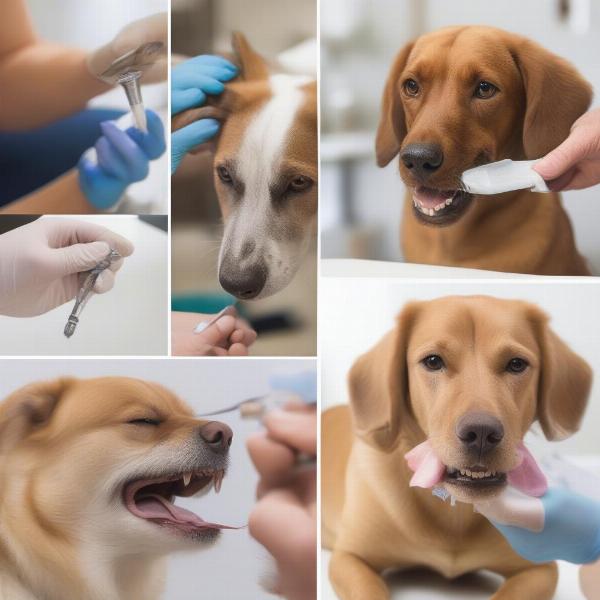Hot dogs and more – while the phrase might conjure images of a backyard barbecue, we’re here to talk about something much more enriching: the wonderful world of dog ownership and all it entails. From choosing the right breed to providing senior care, this guide covers everything you need to know about being a responsible and loving dog parent.
Whether you’re a seasoned dog owner or just starting your journey with a furry friend, caring for a canine companion is a rewarding experience. This comprehensive guide will delve into various aspects of dog care, offering practical advice and expert insights to ensure your dog lives a happy, healthy, and fulfilling life. We’ll explore everything from nutrition and training to grooming and healthcare, equipping you with the knowledge to navigate the exciting adventure of dog ownership.
Choosing the Right Breed for Your Lifestyle
Before bringing a dog home, consider your lifestyle, living space, and activity level. A high-energy breed like a Border Collie might not thrive in a small apartment, while a laid-back Bulldog might not be the best choice for an avid runner. Research different breeds, considering their temperament, grooming needs, and exercise requirements.
Essential Dog Healthcare Tips
Regular vet checkups are crucial for preventative care. Vaccinations, parasite prevention, and dental hygiene are essential for maintaining your dog’s health. Early detection of potential health issues can significantly improve treatment outcomes.
“Regular vet visits are not just about treating illnesses, they are about preventing them. Early detection is key to a longer, healthier life for your dog.” – Dr. Emily Carter, DVM.
 Essential dog healthcare tips: vaccinations, parasite prevention, dental hygiene
Essential dog healthcare tips: vaccinations, parasite prevention, dental hygiene
Mastering Basic Dog Training and Behavior
Positive reinforcement methods are the most effective way to train a dog. Start with basic commands like sit, stay, and come. Consistency and patience are essential. Socialization is also crucial, exposing your dog to various people, places, and sounds from a young age.
Nutritional Needs and Feeding Guidelines
A balanced diet is crucial for your dog’s overall well-being. Choose high-quality dog food appropriate for their age, breed, and activity level. Avoid feeding table scraps, as many human foods are toxic to dogs.
“Just like humans, dogs require a balanced diet to thrive. A good quality dog food is the foundation of their nutritional needs.” – Dr. Sarah Miller, Canine Nutritionist.
Grooming Your Dog for Health and Happiness
Regular grooming is essential for maintaining your dog’s coat, skin, and overall hygiene. Brushing, bathing, nail trimming, and ear cleaning are essential parts of a grooming routine. The frequency of these activities depends on your dog’s breed and coat type.
Exercise and Enrichment for a Happy Dog
Dogs need regular exercise to stay physically and mentally stimulated. Daily walks, playtime, and interactive toys are essential. The amount of exercise required varies depending on breed and age. outside gates for dogs can be a great way to provide a safe and secure outdoor space for your dog to play and exercise.
Caring for Senior Dogs
As dogs age, they may require special care. Senior dogs may need more frequent vet visits, adjusted diets, and medications for age-related conditions. Providing a comfortable and supportive environment is essential for their well-being. canned chicken for dogs can be a good option for senior dogs who have difficulty chewing dry food.
Conclusion
Caring for a dog is a lifelong commitment filled with love, laughter, and unforgettable moments. By understanding your dog’s needs and providing proper care, you can ensure they live a long, happy, and healthy life. From nutrition and training to healthcare and grooming, every aspect of dog care contributes to their overall well-being.
FAQ
- How often should I take my dog to the vet? Annual checkups are recommended for healthy adult dogs, while puppies and senior dogs may require more frequent visits.
- What is the best way to train my dog? Positive reinforcement methods, such as using treats and praise, are generally the most effective.
- What should I feed my dog? Choose a high-quality dog food formulated for their age, breed, and activity level.
- How often should I groom my dog? The frequency of grooming depends on your dog’s breed and coat type, but regular brushing, bathing, nail trimming, and ear cleaning are essential.
- How much exercise does my dog need? The amount of exercise varies depending on breed and age, but daily walks and playtime are crucial.
- How can I find dog-friendly accommodation when travelling? Websites like hotels in snowdonia dog friendly and dog friendly hotels dartmouth devon offer a variety of options.
- What is a long line dog lead and why are they useful? A long line dog lead gives your dog more freedom to explore while still under your control, which is great for recall training.
ILM Dog is your trusted resource for expert advice on all aspects of dog care, from breed selection and healthcare to training and nutrition. We offer comprehensive information and resources to help you navigate every stage of your dog’s life. Whether you’re a new dog owner or a seasoned expert, ILM Dog provides the knowledge and support you need to ensure your canine companion thrives. Contact us at [email protected] or +44 20-3965-8624 for personalized guidance.